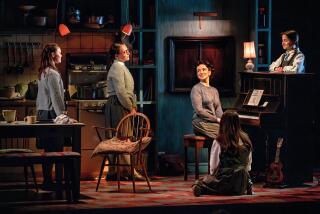First-time playwright, 60, offers a catharsis of one family’s pain and loss.
- Share via
More than five years ago, Rolling Hills actress Nora Boland Ullrich wrote a scene--a confrontation between a young girl and her strong-willed grandmother--for an acting class she was taking.
It came out of her own childhood, touching a dark chord of family strife Ullrich had never resolved. She was the young girl, she recalled, adding that she and her grandmother “never made peace.”
That scene quietly demanded to become a play, turning Ullrich into what she calls a “closet writer” as she steadily worked as a film, television and stage actress: “I would bring it out, and rewrite, and stick it back in the drawer and say, ‘I don’t know.’ ”
“The Rose Shrine,” Ullrich’s two-act memory play about a Long Beach family’s struggle and growth during the turbulence of World War II, finally emerged in 1988. The 60-year-old, first-time playwright calls it a catharsis of her own family’s pain and loss.
The play won second place in the first playwriting contest sponsored by the Norris Theatre for the Performing Arts in Rolling Hills Estates. Now, the Norris’ resident professional theater group, the New Place Theatre Co., is staging “The Rose Shrine” for the first time. Final performances are today at 2:30 and 7 p.m.
Although Ullrich’s girlhood took place in eastern Canada, she shifted the family to Long Beach for the play. The once-gaudy Pike amusement park and its treacherous roller coaster, the Cyclone Racer, is a major setting as the family absorbs the loss of one son in combat, and the controlling grandmother and her willful offspring wage a domestic war rivaling the one overseas.
“I knew Long Beach was a Navy town and I’d been in love with the Pike and the roller coaster,” said Ullrich, who discovered them after moving to California in 1953. Although she said she never had the courage to ride the roller coaster, young Nonie--modeled after Ullrich in the play--does after learning that her brother is missing in action. “It’s her salute to him,” Ullrich said. “She says, ‘Hey, Danny, this is for you.’ ”
She said she’s pleased that the play, which she believes is “about letting go (and) getting on with your life,” is moving audiences: “People cry, people are very moved emotionally. . . . It’s a two-hankie play, maybe three.”
More to Read
The biggest entertainment stories
Get our big stories about Hollywood, film, television, music, arts, culture and more right in your inbox as soon as they publish.
You may occasionally receive promotional content from the Los Angeles Times.









